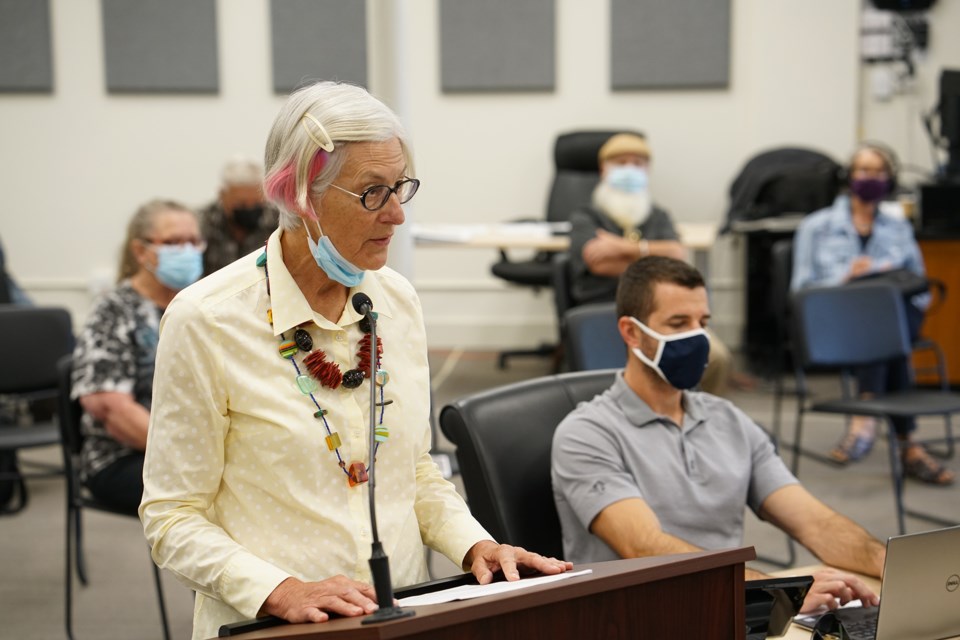City councillors were urged to give careful consideration to a bylaw that would allow a company called Fire Marque to recover insurance costs for the city in cases of fires.
At the August 31 committee of the whole meeting, Kathryn Hjorleifson appeared as a delegation regarding draft bylaw 2662, which raises serious issues, she told councillors.
Hjorleifson said any and all bylaws should be drafted to reflect the intentions of the city and council.
“It has been stated in these chambers, and in an interview with chief [Terry] Peters in the Peak many times that: the owner of the property is not going to receive a bill; the owner of the property is not responsible to pay a bill; an unpaid bill to an insurance company will not be charged back to the owner; an unpaid bill will not be added to the tax roll of the property,” said Hjorleifson.
She said however, item three in the proposed bylaw states: “the owner of the property shall be responsible for the payment of fire department-specific response fees imposed by this bylaw.”
Item five states that: “fees imposed pursuant to this bylaw constitute a debt of the owner to the municipality and may be added to the tax roll,” said Hjorleifson. Item six states: “where the municipality believes fees are applicable but the owner does not have, in part or in full, insurance coverage for fire department charges for the property, the municipality may adjust the fees to the extent of insurance coverage upon provision by the owner of evidence, to the satisfaction of the municipality, that no such insurance coverage exists or to demonstrate the limits of such coverage,” she added.
“So, in summary: the owner is responsible for payment; the debt may be added to the tax roll; the amount of the bill may be greater than the owner’s insurance policy,” said Hjorleifson.
She said her insurance policy states the company will reimburse her up to $10,000 for fire department charges incurred for attending her premises as a result of an insured peril.
“The definition of reimburse is: the action of repaying a person who has spent or lost money, and a sum paid to cover money that has been spent or lost,” said Hjorleifson.
She said that in the instance of a claim, the steps would include presenting a bill to her, perhaps for the amount allowed in the policy, perhaps less, or perhaps more.
“I will have to then pay the city so that I may be reimbursed by my insurance company,” said Hjorleifson. She said she would then present the same bill, with proof of payment, to her insurance company.
“I wait for reimbursement – I don’t know how long,” said Hjorleifson. “I receive payment, hopefully for the amount I paid to the city. If I do not receive full reimbursement from Wawanesa [her insurance company], what recourse do I have from the city?”
Hjorleifson said a second option is she pays the bill but the insurance company denies her claim and reimburses her nothing. She asked if she gets to bill the city back.
A third option is the city bills the insurance company directly and the insurance company pays the city directly for the amount billed, Hjorleifson said.
Option four is that she can’t pay her bill to the city, so it goes against her tax roll for her property.
Hjorleifson said if council intends for fire services other than structural fires to be covered in this bylaw, if it intends for the owner to be responsible for payment, if it intends for a debt to be added to the tax roll, and if it intends that the amount of the bill may be greater than the owner’s insurance policy, then council should vote to pass draft bylaw 2662.
She said if council does not intend those actions, then there are two options. The first is to send the draft bylaw back to the city’s legal and administrative departments for redraft with clear direction on intention for several items. These include a clear statement that the bylaw only pertains to structural fires. The bylaw should remove indemnification technology from the bylaw because it is not required, according to Hjorleifson.
She also asked, what if the owner is not claiming for the fire under their policy?
She said the draft bylaw needs a clear statement about whether the owner is or is not responsible for fees directly. It also needs a clear statement on whether an unpaid fee is or is not to be added to the owner’s tax roll, and whether the fee is or is not to be greater than the owner’s insurance covers, according to Hjorleifson.
The second option, she said, is to vote no to the draft bylaw.
Councillor Rob Southcott asked if there was any chance of the city receiving an unbiased opinion from an unprejudiced third party to advise council, considering the only data so far is from Fire Marque. He also asked if Fire Marque had a monopoly on this kind of business. He said it appeared there were no other competing businesses. Southcott said if there was someone in the community who could undertake the service, it would be aligned with the city’s new procurement policy.
Southcott then asked how could the city claim to get revenue without it becoming a cost somewhere.
“The money has to come from somewhere,” he said. “I wish we could admit this money will come through premiums.”
He said his questions were for staff to answer.
Councillor Cindy Elliott said she thought Hjorleifson’s presentation was extremely informative and helpful to council’s process in deliberating the bylaw.

